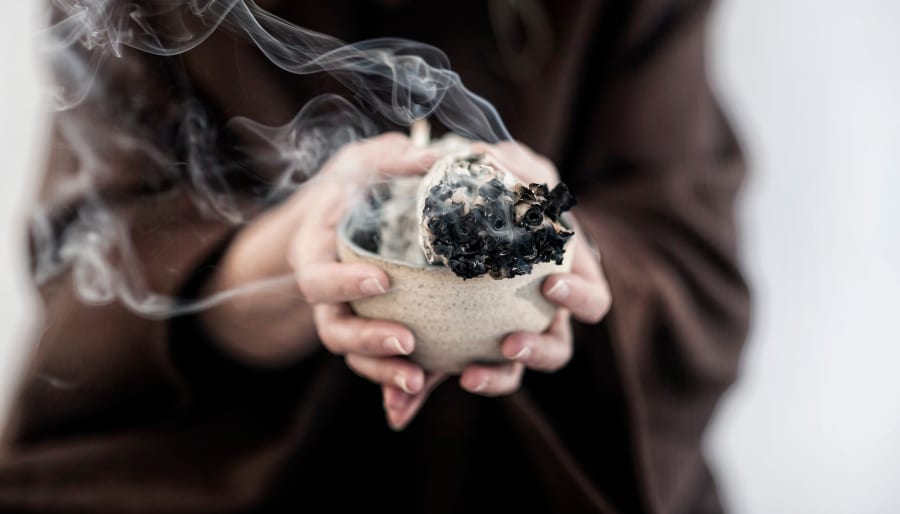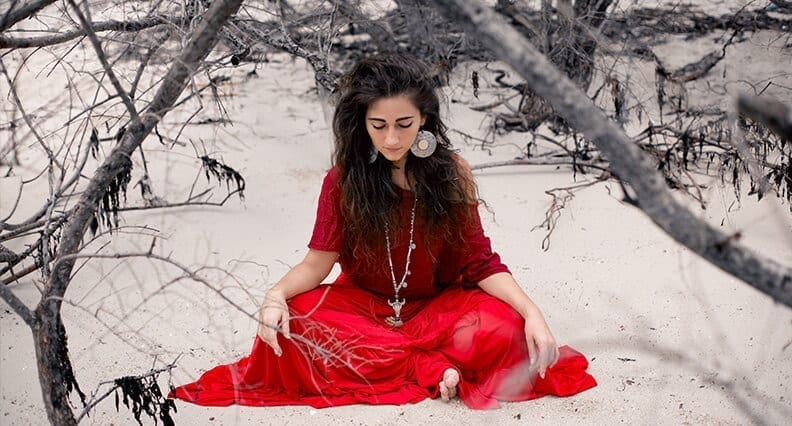I think a lot of people get stuck at first base when ritual is mentioned. For many, the word itself probably has religious, sacrificial or esoteric connotations that they probably wouldn’t want to be associated with.
But this is slowly changing.
The truth is, that ritual doesn’t belong to one tradition, culture, religion or faith system. You don’t need to belong to a certain group or community to practice ritual, and you don’t have to hold specific beliefs.
Ritual can be a part of anyone’s life.
It’s one of those things that’s a human birthright – yet it’s rarely taught, which is why for many people, the practice of ritual is still shrouded in mystery.
What is Ritual?
Ritual is, quite simply, a series of actions, gestures, and sometimes words, performed in a set order.
Usually regularly, i.e. more than once.
Yes, many rituals are prescribed by religious groups (think of wedding vows, for example) but you can just as easily create and practice a ritual of your own in your living room at home! But what really makes a ritual special, and elevates it from being, say, a simple routine to something more sacred, is intention.
Here’s what I mean:
You probably brush your teeth every morning. But is this a ritual? Hmmm… some would say it is – you’re performing the same type of actions, at the same time, each day. Yet in reality, if you’re simultaneously thinking of checking of your to-do list when you get to work, or yelling at the kids to put their shoes on and pretty much unconscious of what you’re actually doing, then no, it’s probably not.
Yet if your mind is on the job, and you’re consciously engaged in what you’re doing with that brush, then you’re getting closer. Add in the element of intention too – perhaps silently thanking your teeth for all they do for you, or holding the intention to clean out your mouth energetically as well as physically, then yes, this could be described as a ritual.
What is Ceremony?
For most people, the terms ritual and ceremony are interchangeable. Ceremony tends to have more religious connotation, and usually refers to more elaborate, structured events that involve many people. Think of it as the difference between a house blessing ritual with you and your partner, and a wedding ceremony, which involves your extended family, somebody ordained to lead it, and all the added extras…
Why are Rituals Important?
Rituals can be small and seemingly insignificant – like the toothbrushing example above – or huge, elaborate affairs involving many other people.
They each serve their own purpose, yet overall, rituals share some common themes and meaning.
- Ritual provides a way to connect the seen and the unseen realms.
- Ritual makes change more effective and transition easier.
- Ritual makes your beliefs stronger
- Ritual unifies people
- And ritual fosters a sense of wellbeing.
Rituals and Rites
There are rituals that exist for the purpose of marking transitions in a person’s journey through life, and these are known as rites.
Here in the West we tend to celebrate birthdays, yet the usual birthday parties are pretty far removed from the rites of our ancestors. Many generations ago, rites such as menarch (when a girl bled for the first time) and the individuation of young men, as they transitioned from childhood into adulthood would be celebrated with ritual. Yet it was more than a mere celebration. Rites of passage were initiations – opening the door to a new way of being in the world, and at the same time inviting in the blessings of Spirits, ancestors, and beings of the unseen realms, to guide and support.
Seasonal Celebrations
In earth-based traditions such as Paganism, certain seasonal rituals are performed at specific times of the year. Some of these still remain in our Christianized culture, yet they’ve been kidnapped, and given new names.
Yule or the winter solstice would be marked with rituals such as candle lighting, holly wreaths and yule logs (no, not the chocolate kind!)
Samhain (renamed Halloween) is another Celtic festival with its origins in ancestral connection and honoring. The day of the Dead in Mexico shows how cross-cultural these seasonal celebrations truly are.
Imbolc (renamed as Candlemas) is an early spring fire festival, and ritual would be performed using fire (of course!) and often homes would be cleaned at this time. But this wasn’t just getting out the soap and dusters and giving things a once over! Ritual cleansing was a sacred and co-creative act with the Spirits – a potent energetic practice of clearing away the darkness to make way for the light. Done via ritualistic actions.
CHECK OUT THIS POST TO FIND OUT MORE ABOUT THE 8 PAGAN HOLIDAYS
Beyond the individual deities they honored, and the cleansing, creative or transitional purpose they served, seasonal rituals also existed to connect people to the greater cycles of nature.
This brought perspective, belonging and a greater sense of purpose.
It’s something that many modern folks are lacking, and the lack of ritual and ceremony in our lives could be one root in the sense of collective disconnection that pervades.
More Ritual Ideas
Outside of the confines of formal religion and the rituals they prescribe (think weddings, holy sacraments, baptisms, bar mitzvahs, etc.) there are many types of ritual that you can try at home:
- New Moon intention setting
- Full Moon gratitude
- Home Blessing
- Cord-cutting
- Ritual Bathing
- Anointing the body
- Burning/fire rituals for release
OR, why not create your own? It doesn’t need to be attached to a belief system – try these:
- When hand-washing before dinner, energetically ‘wash away’ any negativity from your life.
- Each Monday (or any day!) sit down for a family dinner, where you all offer up gratitude.
- A Sunday afternoon tea ceremony with a friend, where you ask for blessings for your week are both rituals you could try, to add real value and connection to your life.
- Each evening before bed, write down three examples of beauty that you experienced that day.
Think outside of the box! And if you’re strapped for time, like so many of us are, then try to ritualize something you already to – making tea, brushing your hair, or eating meals with family. It needn’t be dramatic and life-altering! In fact, some of the more powerful practices are steady, slow-burning, homespun affairs.
What are YOUR favorite rituals? Or what kind of ritual do you think would most benefit your life?
Share with us in the comments below!


